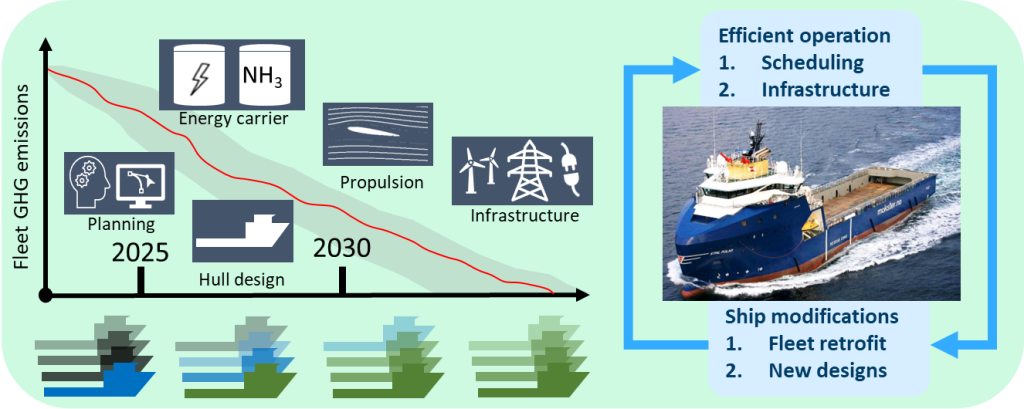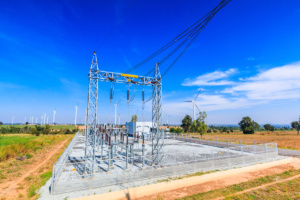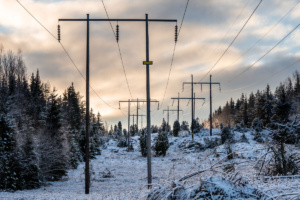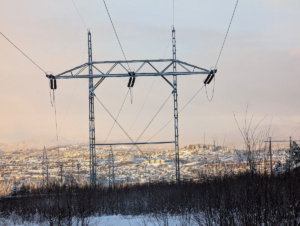Platform supply vessels (PSVs) contribute ca 1 million tonnes of CO2 annually, making them the largest greenhouse gas source in the offshore logistics supply chain. The government’s directive to implement zero- and low-emission solutions by 2030 sets the stage for transformative change.
With 16% of the Norwegian-owned offshore fleet already embracing low-emission technologies, the path to zero emissions involves navigating challenges like limited energy carrier availability and high costs. The ZeroLog project, an initiative within the LowEmission Research Centre, strives to chart this course collaboratively. By uniting O&G operators, ship owners, and industry experts, the project aims to analyze and optimize fleet planning, vessel operations, and design modifications.
Requirements for low and zero emission solutions
Platform supply vessels (PSVs) account for about 1 mill. tonnes of CO2 emissions per year [1], and represent the largest greenhouse gas (GHG) emission source in the offshore logistics supply chain [2] for oil and gas (O&G) operators at the Norwegian Continental Shelf (NCS). The Ministry of Climate and Environment lists the implementation of zero- and low-emission solutions in the offshore vessel fleet as the second step towards reducing maritime domestic fleet emissions [3], and the government’s strategic document “Hurdalsplattformen” signals an intention to introduce requirements for low-emission solutions by 2025 and zero-emission by 2030 for offshore supply vessels [4].
Given the predominantly young age and high-quality specifications of the existing PSV fleet, realization of a zero-emission fleet is expected to consist of a period with fleets including both ships utilizing marine gas oil (MGO), retrofits and newbuilds utilizing novel energy carriers. There exist no emission-free PSVs as of today, however, three percent of the global offshore vessel fleet has adopted low-emission solutions.
Sixteen percent of the Norwegian-owned offshore vessel fleet uses low-emission solutions, such as hybrid electric propulsion systems and LNG/LPG [5]. Power system suppliers are also developing systems for future energy carriers such as hydrogen, ammonia, biogas, and methanol. However, availability of these energy carriers is scarce, energy density is lower, costs are expected to be high and will require infrastructure development for production, distribution and bunkering. Hence, future zero-emission ships for offshore logistics need to be designed as part of a system where access to, storage capacity for, and cost of energy are of greater importance than today, while still maintaining the required levels of offshore supply service and operational performance.
Offshore support fleet of the future
The existing offshore support fleet is large and highly specialised, but young, which will require slow but steady transition towards zero emissions. With a multitude of low- and zero-emission options and opinions on how these will come info practical use in the future, there is no simple answer to decarbonisation of the offshore fleet. The answer does not lie in just upgrading the fleet to zero-emission fuels.
Operators on the NCS are in need for a common understanding and the ways forward towards future sustainable offshore fleets and logistics. Thus, one of the project’s goals is to facilitate exchange of ideas and cooperation between all partners on defining and agreeing on future scenarios for PSV upgrades with low- and zero-emission technologies, availability of new energy carriers and infrastructure, and expected changes to the PSV fleet’s operational profile.
ZeroLog – Research for low- and zero-emission fleet realization
In the LowEmission Research Centre SINTEF researchers have been working in close dialog with O&G operators on the development of digital tools for analysis and optimisation of fleet planning, vessel operations, vessel performance and vessel design. The ZeroLog project will build on the results achieved and develop a framework for unified analysis of future ship modifications and vessel operations. The project consortium extends on the LowEmission partners by adding the ship owner/operator Simon Møkster Shipping, energy storage solution supplier Corvus Energy, ship designer and system integrator Sirius Design & Integration, and integrated logistics services provider EndVision.

Research partners include SINTEF Ocean, SINTEF Industry, NTNU and SNF. The research partners will advance their research efforts on the topics of energy system and hydrodynamic vessel performance, fleet level and operational planning, vessel design, resource sharing and cooperation. All partners together will work towards identifying and analysing the relevant fleet compositions and renewal strategies towards 2030 and 2050 goals.
Starting with today’s fleet of marine gas oil powered ships, alternatives for introducing retrofitted ships and ships utilizing novel energy carriers will be evaluated. Additional attention will be given to identifying potential barriers and important system level factors for low- and zero-emission fleet realization. Advice for next steps for realisation of ambitions towards 2030, knowledge gaps and technology development needs towards 2050 will be documented in project results.
References
[1] DNV GL. (2014). Sjøkart for grønt skipsfart. Rapport for Grønt Skipsfartsprogram. DNV GL.
[2] Gribkovskaia, V., Holte, E. A., Flatberg, T., & Nonås, L. (2019). Current state of offshore logistics. Deliverable Report DT9_2019_01. . LowEmission Research Centre.
[3] Klima- og miljødepartement. (2020). Meld. St. 13 (2020-2021) Melding til Stortinget: Klimaplan for 2021-2030. Oslo: Klima- og miljødepartement.
[4] Arbeiderpartiet og Senterpartiet. (2021). Hurdalsplattformen (2021-2025): For en regjering utgått fra Arbeiderpartiet og Senterpartiet. Oslo: Regjeringen.
[5] Forskningsrådet. (2022). Maritim21 strategi. Forskningsrådet.









Comments
No comments yet. Be the first to comment!